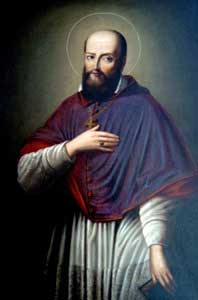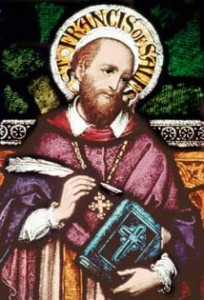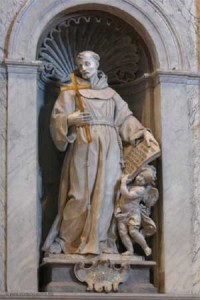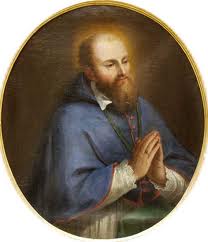On Holy Mother Mary
On Holy Repentance
 CHAPTER III. Devotion is suitable to every Vocation and Profession.
CHAPTER III. Devotion is suitable to every Vocation and Profession.
WHEN God created the world He commanded each tree to bear fruit after its kind; 88 Gen. i. 12. and even so He bids Christians,—the living trees of His Church,—to bring forth fruits of devotion, each one according to his kind and vocation.
A different exercise of devotion is required of each—the noble, the artisan, the 9 servant, the prince, the maiden and the wife; and furthermore such practice must be modified according to the strength, the calling, and the duties of each individual.
I ask you, my child, would it be fitting that a Bishop should seek to lead the solitary life of a Carthusian? And if the father of a family were as regardless in making provision for the future as a Capucin, if the artisan spent the day in church like a Religious, if the Religious involved himself in all manner of business on his neighbour’s behalf as a Bishop is called upon to do, would not such a devotion be ridiculous, ill-regulated, and intolerable? Nevertheless such a mistake is often made, and the world, which cannot or will not discriminate between real devotion and the indiscretion of those who fancy themselves devout, grumbles and finds fault with devotion, which is really nowise concerned in these errors.
No indeed, my child, the devotion which is true hinders nothing, but on the contrary it perfects everything; and that which runs counter to the rightful vocation of any one is, you may be sure, a spurious devotion.
Aristotle says that the bee sucks honey from flowers without damaging them, leaving them as whole and fresh as it found them;—but true devotion does better still, for it not only hinders no manner of vocation or duty, but, contrariwise, it adorns and beautifies all.
Throw precious 10 stones into honey, and each will grow more brilliant according to its several colour:—and in like manner everybody fulfils his special calling better when subject to the influence of devotion:—family duties are lighter, married love truer, service to our King more faithful, every kind of occupation more acceptable and better performed where that is the guide.
It is an error, nay more, a very heresy, to seek to banish the devout life from the soldier’s guardroom, the mechanic’s workshop, the prince’s court, or the domestic hearth. Of course a purely contemplative devotion, such as is specially proper to the religious and monastic life, cannot be practised in these outer vocations, but there are various other kinds of devotion well-suited to lead those whose calling is secular, along the paths of perfection. The Old Testament furnishes us examples in Abraham, Isaac and Jacob, David, Job, Tobias, Sarah, Rebecca and Judith; and in the New Testament we read of St. Joseph, Lydia and Crispus, who led a perfectly devout life in their trades:—we have S. Anne, Martha, S. Monica, Aquila and Priscilla, as examples of household devotion, Cornelius, S. Sebastian, and S. Maurice among soldiers;—Constantine, S. Helena, S. Louis, the Blessed Amadaeus, 99 It is probable that S. Francis here means to indicate Amadeo IX., Duke of Savoy, who died 1472. and 11 S. Edward on the throne. And we even find instances of some who fell away in solitude,—usually so helpful to perfection,—some who had led a higher life in the world, which seems so antagonistic to it. S. Gregory dwells on how Lot, who had kept himself pure in the city, fell in his mountain solitude. Be sure that wheresoever our lot is cast we may and must aim at the perfect life.
Check out other Discerning Hearts Posts on St. Francis de Sales
[p2p type=”id” value=”2281″]
[p2p type=”id” value=”2622″]
Meditations from the Introduction to the Devout Life by St. Francis de Sales
Tags: chapter xix, devotion, family, heresy, holy mother mary, introduction to the devout life, love, repentance, st francis de sales
This entry was posted on Thursday, January 24th, 2013 at 12:07 am
You can follow any responses to this entry through the RSS 2.0 feed.
Denver, Colo., Jan 23, 2011 / 07:09 am (CNA/EWTN News).- On Jan. 24, during the Week of Prayer for Christian Unity that runs from Jan. 18-25, Catholics will celebrate the life of St. Francis de Sales. A bishop and Doctor of the Church, his preaching brought thousands of Protestants back to the Catholic fold, and his writings on the spiritual life have proved highly influential.
The paradoxical circumstances of Francis’ birth, in the Savoy region (now part of France) during 1567, sum up several contradictory tendencies of the Church during his lifetime. The reforms of the Council of Trent had purified the Church in important ways, yet Catholics and Protestants still struggled against one another – and against the temptations of wealth and worldly power.
Francis de Sales, a diplomat’s son, was born into aristocratic wealth and privilege. Yet he was born in a room that his family named the “St. Francis room†– where there hung a painting of that saint, renowned for his poverty, preaching in the wilderness. In later years, Francis de Sales would embrace poverty also; but early in his ministry, the faithful chided him for having an aristocratic manner.
In many ways, Francis’ greatest achievements – such as the “Introduction to the Devout Life,†an
innovative spiritual guidebook for laypersons, or his strong emphasis on the role of human love in Christian devotion – represent successful attempts to re-integrate seemingly disparate “worldly†and “spiritual†realities into one coherent vision of life.
Few people, however, would have predicted these achievements for Francis during his earlier years. As a young man, he studied rhetoric, the humanities, and law. He had his law degree by age 25, and was headed for a political career. All the while, he was keeping the depths of his spiritual life – such as his profound devotion to the Virgin Mary, and his resolution of religious celibacy – a secret from the world.
Eventually, however, the truth came out, and Francis clashed with his father, who had arranged a marriage for him. The Bishop of Geneva intervened on Francis’ behalf, finding him a position in the administration of the Swiss Church that led to his priestly ordination in 1593. He volunteered to lead a mission to bring Switzerland, dominated by Calvinist Protestantism, back to the Catholic faith.
Taking on a seemingly impossible task, with only one companion – his cousin – the new priest adopted a harsh but hopeful motto: “Apostles battle by their sufferings, and triumph only in death.” It would serve him well as he traveled through Switzerland, facing many Protestants’ indifference or hostility, and being attacked by wild animals and even would-be assassins.
Some of Francis’ hearers –even, for a time, John Calvin’s protege Theodore Beza– found themselves captivated by the thoughtful, eloquent and joyful manner of the priest who implored their reunion with the Church. But he had more success when he began writing out these sermons and exhortations, slipping them beneath the doors that had been closed against him.
This pioneering use of religious tracts proved surprisingly effective at breaking down the resistance of the Swiss Calvinists, and it is estimated that between 40,000 and 70,000 of them returned to the Church through his efforts. He also served as a spiritual director, both in person and through written correspondence, with the latter format inspiring the “Introduction to the Devout Life.â€
In 1602, Francis was chosen to become the Bishop of Geneva, a position he did not seek or desire. Accepting the position, however, he gave the last twenty years of his life in ongoing sacrifice, for the restoration of Geneva’s churches and religious orders. He also helped one of his spiritual directees, the widow and future saint Jane Frances de Chantal, to found an order with a group of women.
Worn out by nearly thirty years of arduous travel and other burdens of Church leadership, Francis fell ill in 1622 while visiting one of a convent he had helped to found in Lyons. He died there, three days after Christmas that year. St. Francis de Sales was canonized in 1665, and honored as a Doctor of the Church in 1877.
Because of the crucial role of writing in his apostolate, St. Francis de Sales is the patron of writers and journalists. He is also widely credited with restoring, during his own day, a sense of what the Second Vatican Council would later call the “universal call to holiness†– that is, the notion that all people, not only those in formal religious life, are called to the heights of Christian sanctification. – CNA/EWTN News
A Prayer of St. Frances de Sales
Lord, I am yours,
and I must belong to no one but you.
My soul is yours,
and must live only by you.
My will is yours,
and must love only for you.
I must love you as my first cause,
since I am from you.
I must love you as my end and rest,
since I am for you.
I must love you more than my own being,
since my being subsists by you.
I must love you more than myself,
since I am all yours and all in you.
AMEN.
Check out other Discerning Hearts Posts on St. Francis de Sales
[p2p type=”id” value=”2622″]
[p2p type=”id” value=”2286″]
Meditations from the Introduction to the Devout Life by St. Francis de Sales
Tags: catholic, catholic podcast, catholic prayer, cathollc spirituality, doctor of the church, Francis De Sales, introduction to the devout life, spiritual guidebook, st francis de sales
This entry was posted on Tuesday, January 24th, 2012 at 12:09 am
You can follow any responses to this entry through the RSS 2.0 feed.
VATICAN CITY, 2 MAR 2011 (VIS) – During today’s general audience, which was held in the Paul VI Hall, the Pope spoke about St. Francis de Sales, bishop and doctor of the Church who lived in the sixteenth and seventeenth centuries.
Born in 1567 to a noble family in the Duchy of Savoy, while still very young Francis, “reflecting on the ideas of St. Augustine and St. Thomas Aquinas, underwent a profound crisis which led him to question himself about his own eternal salvation and about the destiny God had in store for him, experiencing the principle theological questions of his time as an authentic spiritual drama“. The saint “found peace in the radical and liberating truth of God’s love: loving Him without asking anything in return and trusting in divine love; this would be the secret of his life”.
Francis de Sales, the Holy Father explained, was ordained a priest in 1593 and consecrated as bishop of Geneva in 1602, “in a period in which the city was a stronghold of Calvinism. … He was an apostle, preacher, writer, man of action and of prayer; committed to realising the ideals of the Council of Trent, and involved in controversies and dialogue with Protestants. Yet, over and above the necessary theological debate, he also experienced the effectiveness of personal relations and of charity”.
With St. Jane Frances de Chantal he founded the Order of the Visitation, characterised “by a complete consecration to God lived in simplicity and humility“. St. Francis of Sales died in 1622.
In his book “An Introduction to the Devout Life”, the saint “made a call which may have appeared revolutionary at that time: the invitation to belong completely to God while being fully present in the world. … Thus arose that appeal to the laity, that concern for the consecration of temporal things and for the sanctification of daily life upon which Vatican Council II and the spirituality of our time have laid such emphasis”.
Referring then to the saint’s fundamental work, his “Treatise on the Love of God”, the Pope highlighted how “in a period of intense mysticism” it “was an authentic ‘summa’ and at the same time a fascinating literary work. … Following the model of Holy Scripture, St. Francis of Sales speaks of the union between God and man, creating a whole series of images of interpersonal relationships. His God is Father and Lord, Bridegroom and Friend”.
The treatise contains “a profound meditation on human will and a description of how it flows, passes and dies, in order to live in complete abandonment, not only to the will of God, but to what pleases Him, … to His pleasure. At the apex of the union with God, beyond the rapture of contemplative ecstasy, lies that well of concrete charity which is attentive to all the needs of others”.
Benedict XVI concluded his catechesis by noting that “in a time such as our own, which seeks freedom, … we must not lose sight of the relevance of this great master of spirituality and peace who gave his disciples the ‘spirit of freedom’, true freedom, at the summit of which is a fascinating and comprehensive lesson about the truth of love. St. Francis of Sales is an exemplary witness of Christian humanism. With his familiar style, with his parables which sometimes contain a touch of poetry, he reminds us that inscribed in the depths of man is nostalgia for God, and that only in Him can we find true joy and complete fulfilment”.
Check out other Discerning Hearts Posts on St. Francis de Sales
[p2p type=”id” value=”2281″]
[p2p type=”id” value=”2286″]
Tags: catholic, catholic podcast, catholic prayer, cathollc spirituality, doctor of the church, introduction to the devout life, st francis de sales
This entry was posted on Wednesday, March 2nd, 2011 at 11:42 am
You can follow any responses to this entry through the RSS 2.0 feed.



